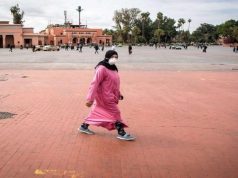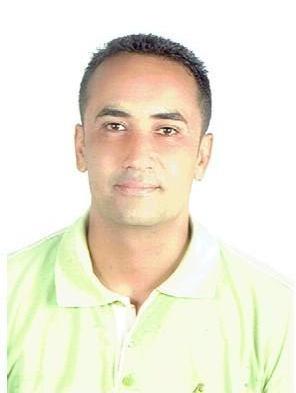[symple_box]  Mohamed Zakaria Laghmam is a professor of English and a PhD candidate in cultural studies at the University of Sidi Mohammed Ben Abdellah Fez, Morocco. Mohamed can be reached at laghmam-zakaria@hotmail.fr[/symple_box]
Mohamed Zakaria Laghmam is a professor of English and a PhD candidate in cultural studies at the University of Sidi Mohammed Ben Abdellah Fez, Morocco. Mohamed can be reached at laghmam-zakaria@hotmail.fr[/symple_box]

Iran established a political Shiite group in Lebanon known as Hezbollah to protect and to serve its interests. It is in fact a network that spans across many countries and whose aims are to serve ideologically, politically and militarily the Shiite cause. Iran financially and militarily supports Hezbollah, which strongly adheres to the ideologies of the Mullah regime in Tehran. This idea is affirmed by Amal Ghorayeb who clearly states that “Hezbollah’s existence as an organizational entity, as well as its identity as a Shia Islamic movement” is fundamentally derived “from its adherence to his guardianship (referring to Ayatollah Khomeini). Accordingly, Hezbollah becomes “the only organization in the Shia world, outside of Iran, which officially subscribes to the Wilayat al-Faqih (Guardianship of the Jurisprudent)”[1]. It is because of this Shiite sectarian group that Lebanon has become weak and continuously suffers from internal, external problems and conflicts that contribute to the undermining of the Lebanese state. In this respect, I would like to endorse the idea defended by Vincent Crapanzano when he evidently states that
“Lebanon is a nation-state, a recent one, that has been so troubled by internal dissonance and external pressures so violent, so pre-possessive, so imperially assumptive that I wonder if it is a nation-state that is deprived of its sovereignty. Is it, as Salah Hassan’ argues, an “unstated state” by which he means both the unutterable and a condition of the state that is “no longer a state … that is bereft of the means to uphold or impose the rule of law in its territory or at its borders through mechanisms of force.”[2] (my emphasis).
In this context, I would like to make a clear point, this beautiful country Lebanon is in fact systematically exhausted and things are getting worse there as the armed Iranian terrorist militia Hezbollah is demolishing and gulping down the country part by part, dominating more of its institutions and forcing its Shiite-Iranian ideology on many people through the use of money, terrorization and assassination. In accordance with this, Hezbollah is accused of committing many crimes and assassinations that target essentially Sunni leaders of the country. This confirms that Hezbollah is intrinsically a sectarian party par excellence; consequently, the party turns into a destabilizing factor in Lebanon and in the region as well. If it is not a destabilizing factor, then why this religious Shiite party does not want to be part of the Lebanese army? Why does it insist on not joining the Lebanese army? The army that represents the only side that has the right to possess weapons, defend and protect the nation. Why does their leader Nassrallah declare openly and strongly that the party is deeply faithful and will remain loyal to the Mullah regime in Tehran? Check the following video from a speech recorded in the 1980’s, with English subtitles.
In the light of his speech, it could be deduced that Nassrllah, the leader of Hezbollah, confirms clearly and vehemently that he is part of the Mullah regime in Tehran and that his project will be the establishment of an “Islamic” state under the leadership of the Iranian regime and specifically under the rule of the jurisprudent ruler.
Some people might think that Hezbollah represents “resistance”? The question here is it really resistance or entrepreneurship? What kind of resistance is this if Iran and Hezbollah are in a continuous process of supporting, funding and sending mercenaries to the Assad’s gang to kill innocent people, to destroy Syria’s historical heritage of buildings, Islamic sites, churches, mosques and worse of all to rape Syrian women? The reason behind such support is mainly motivated by sectarian forces as the regime or rather the gang in Damascus is a Shiite one that endorses the Shiite-Iranian ideology as well. They even consider sending the mercenaries to fight there and giving weapons to the Criminal regime in Syria as a Jihadist mission. Lately, many Hezbollah mercenaries have been killed by the revolutionaries in Syria. Hezbollah organized funerals to them and their leaders always say that “these men were brave and that they have successfully carried out their religious jihadist duty in Syria”. It is jihadist because the target here is not the Israelis but the target is the Syrians, Sunni people who, according to the Shiite religious belief, are infidels and disbelievers. To confirm this, listen to these recorded lectures given by Shiite Scholars in which they state implicitly and explicitly that Sunni people are infidels.
This justifies Hezbollah’s intervention in Syria and proves that this Iranian militia in Lebanon is a sectarian group by nature. The danger of Shiite terrorism is in fact something that Morocco knows best. In 2008, the Moroccan intelligence succeeded in discovering and dismantling a Shiite terrorist group. This group was known as the Bellieraj group or network whose members were planning to carry terrorist attacks that target Moroccan civilians. Among the arrested was a correspondent of Hezbollah’s channel “Al- Manar”. Accordingly, one could deduce from this that Iran, Hezbollah and the Assad’s regime do in fact represent a big threat and an imminent danger to the stability and to the security of Arab and Muslim countries. As a result, Morocco is invited to issue a law that criminalizes any activities carried out by this party or its followers, and more importantly, Morocco should blacklist this party as a terrorist group. Thankfully, Morocco has responded to this call and considered Hezbollah a terrorist group.
[1] – Amal Saad Ghorayeb, “Khamenei and Hezbollah: Leading in Spirit”, in Al Akhbar English, Published on Wednesday, August 8, 2012.
[2] – Paul Tabar and Jennifer Skulte-Ouaiss, Politics, Culture and the Lebanese Diaspora. (Cambridge Scholars Publishing, 2010)., p. X.





